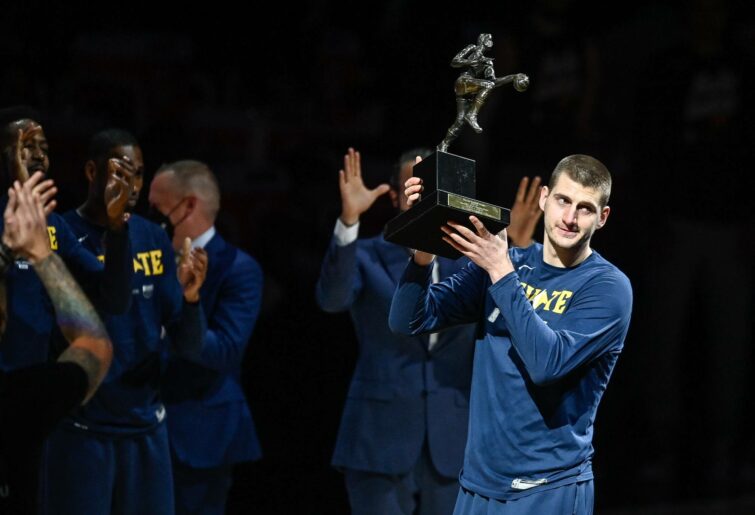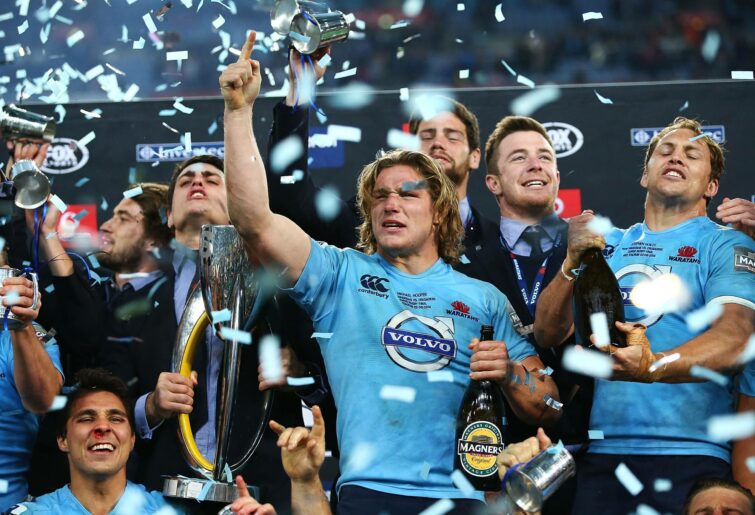'Run-on debut like no other': Junior Wallabies flyer announces himself to the world after stunning hat-trick
In 15 minutes, Tim Ryan didn’t just put a smile on Joe Schmidt’s face, he announced himself to the Australian public by scoring a…
Opinion
If you have ever been to Las Vegas, it quickly becomes apparent that the glitzy streets and desert heat feel about as far from Ice Hockey heartland as you can get.
When people think NHL, they conjure up images of frozen lakes and angry Canadians with missing teeth, not the gaudy casinos and luxury shopping centres of the Las Vegas strip.
Yet up to a hundred thousand Nevada natives crammed Toshiba Plaza and the surrounding streets to watch the NHL Stanley Cup Champions, the Vegas Golden Knights participate in a parade and celebrations along the famous party strip.
Similar scenes happened in Denver, after the City’s championship-winning NBA franchise who recently lifted the Larry O’Brien trophy.
Under a decade ago the Nuggets struggled to sell out the home arena weekly as many of the City’s residents were drawn to the Denver’s NFL franchise the Broncos or to extreme alpine sports due to Denver’s proximity to some of the worlds best ski resorts.
Yet last week, again hundreds of thousands of fans crammed the streets to party with their heroes, and party they did with the days long scenes of raucous behaviour being beamed around the world.
These are the celebrations of people that have been on an epic journey with their team, celebrations of fans and players that realise that these scenes do not come around too often.
Here in Australia, we have similar scenes when a club wins the AFL, NRL or to a lesser extent the A-League titles, including weeklong lead ups filled with fan events, player engagements and festivals of footy, all these things drive home a message that making the final is a big deal and should be embraced by all involved.
Yet despite these scenes both here and across the world, one Australian sporting body is working within a framework that is making it immensely difficult for its teams to experience grand final glory.
Super Rugby Pacific has just completed its second season in this current format and only one Australian team progressed further than the quarter finals – the ACT Brumbies – and for the second year in a row fell painfully short of making a final.
In fact, in any form of the competition where teams from other nations have participated, Australian teams are going nearly a decade without a championship to their name.
This is mostly because the success of the national side – the Wallabies – has been almost the sole focus of the organisation, which means that the health and success of the Super Rugby teams seems to be a secondary thought.
The most glaring issue with that strategy is that the Wallabies have been perennial underachievers, in the last decade the side has won zero World Cups, zero Bledisloe Cups.

Nikola Jokic. (Photo by Dustin Bradford/Getty Images)
In fact the only International honours of any note was when the Wallabies won the 2015 Rugby Championship, (not so coincidentally the year after the NSW Waratahs last won the Super Rugby Competition) so it is not as in this strategy is really setting the national team up for success.
With these statistics and results, Super Rugby Pacific basically appears as 14-round training camp for the Wallabies, and a failing one at that.
For better or worse Rugby Australia has tied itself to the New Zealand and the Super Rugby Pacific format for the foreseeable future, so hopes of going it alone like in the Covid ravaged times of 2020 are all but dead, and scenes of an all-Australian final when forty thousand fans filed into Suncorp Stadium seem about as likely as an Alpine Skiing final in Barbados.
The main flaw with a competition such as the 2020 Super Rugby Australia is that with only five teams playing each other the competition would quickly become stale and predictable, and with a probable average crowd of around eight thousand (although this is a very difficult number to confirm as Rugby Australia prevent Austadiums from releasing figures in most cases).
The last thing the competition needs is to be seen as anything but predictable.
The reason making and winning finals and championships is such a big deal, why fans get so invested, why they celebrate so hard is because they are incredibly hard to win (except if you are maybe the Crusaders) and they need to be, hard but not impossible.
At present Rugby Australia are making it almost impossible and all areas of the game are suffering.
Rugby Australia’s Chair, Hamish McLennan’s ego appears to be the biggest roadblock to the setting up of an independent committee to address specific Super Rugby concerns.

Michael Hooper of the Waratahs celebrates with team mates during the Super Rugby Grand Final match between the Waratahs and the Crusaders at ANZ Stadium on August 2, 2014 in Sydney, Australia. (Photo by Mark Nolan/Getty Images)
So the first order of business, before a fanciful draft or signing of overpriced NRL players is to make this happen. If this is set up correctly with the right balance, of clubs, governing bodies, investors and playing groups, Super Rugby may finally be able to flourish.
The second and equally as important step is that RA needs to untangle itself from the Super Rugby competition.
The second order of business should be giving the teams full control of their roster.
In March of this year, the Brumbies were almost untouchable, undefeated, and flying high, their biggest test of the year heading over to Christchurch to take on Kiwi heavyweights the Crusaders who were ripe for the picking at the point of the comp having started with a 2-2 record.
In what could have been a statement game for the Brumbies and Australian rugby against a team that they haven’t beaten away from home in decades, they used that opportunity to sit out five of their best players due to a policy from head office, essentially admitting defeat before a ball was kicked.
Losing becomes habitual, and when you lose as often as Aussie teams do in NZ that habit needs to be broken.
Super Rugby franchises need to be able to play their best players at every opportunity, Australian teams need experience in winning, especially in New Zealand.
Rugby Australia should be empowering its teams to sign and pick the best players possible and giving them the funds to it through an equal share of the broadcast revenue seeing as how Super Rugby most of the heavy lifting does as far as content is concerned.
Going back to the scenes in Las Vegas and Denver earlier this month, both the teams raised tens of millions of dollars in merchandise sales and memberships, as well as fans who have created lifelong memories and a newfound sense of loyalty.
There is no better feeling as a fan than going on a journey with your team and celebrating like mad after, problem is Australian Super Rugby fans will never get to experience that feeling in the current format.
Both the aforementioned sports basketball and ice hockey are international with global fans and an Olympic presence, but unlike rugby in Australia they still put a high emphasis on a world-class franchise-based domestic competition.
While it is not the only thing, it is everything, just look at the scenes in Vegas and Denver.